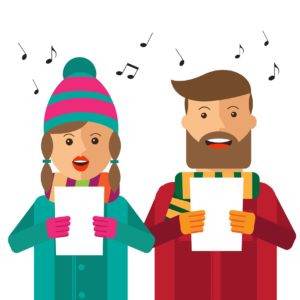
Depending on your family’s traditions and where you grew up, you might have either heard caroling in your neighborhood or have sung in a merry band of well-wishers yourself. You might suspect that donning gay apparel and going door to door to serenade celebrants with seasonal songs has origins in pre-Christian traditions. After you learn about the possible roots of modern caroling customs, you may conclude that the lyric “’Tis the season to be jolly” is imbued with more meaning than we usually realize.
Origins in Outdoor Folk Performances?
While the history of caroling can be hard to trace, some medievalists suggest that the practice sprang from a folk tradition known as “mumming.” These European mummers were roving troupes of costumed entertainers who would sing, dance and act, and the content of their performances ranged from the dramatic to the ribald. Medievalists.net contributor Carolyn Emerick reveals that earlier carolers formed similar groups and traveled during the winter holiday season in the Middle Ages. Citing from “The Book of Christmas Folklore” by Tristram P. Coffin, Emerick discloses that the Catholic Church viewed such displays as “sinful” and “pagan,” going so far as to issue decrees against caroling in 1209 and 1435.
European Christmas Celebrations Got Rowdy
Meanwhile, Christmastime high-spirited revelry continued to be popular in Europe throughout the rest of the Middle Ages and the Renaissance period. History.com writer Christopher Klein documents that intoxicated English holiday celebrants frequently engaged in boisterous and licentious behavior up until Puritan legislators began outlawing public observations in the mid-1600s. As part of their merrymaking, bands of people would go from door to door insisting on gifts of food or money in return for carols or Christmas wishes. These practices were somewhat similar to “trick or treat” customs rooted in pre-Christian Celtic Samhain observances.
Wassailing: English Traditions from Old Norse Customs
A few sources propose that caroling also may have older roots in wassailing. A 2015 article in The Independent reveals that the word “wassail” is derived from an Old Norse expression, “ves heill,” which translates to “be healthy.” Likely introduced to old England by its Danish-speaking inhabitants, the practice can manifest in one of two forms. Some modern revivals hark back to original pagan ceremonies in apple orchards, held in anticipation of the upcoming spring season or to commemorate the fall harvest.
The hot mulled cider drink, crafted from apple juice blended with sugar and spices such as cinnamon, ginger and nutmeg, eventually became a cold-weather favorite among carolers. Many different recipes for wassail exist, but its creation continues today amongst modern folk reconstructing older pre-Christian homages to fruit-bearing trees as well as among wandering groups of holiday singers. The original Christmastime traditions of wassailing involved roaming one’s neighborhood and offering cups of the cider in exchange for gifts.
A Legacy Left in Modern Christmas Songs
Hints of these practices from time past can still be seen in our carols today. England’s musical history includes scores of wassailing songs, including the popular “Gloucester Wassail.” While the tune “We Wish You a Merry Christmas” doesn’t specifically mention the hot spicy concoction, it does include a lyrical declaration that the singers will not leave without their “figgy pudding and a cup of good cheer.” Finally, “Here We Come A-Wassailing” is sometimes rendered as “Here We Come A-Caroling” in modern editions.
Like many of our winter holiday traditions, the custom of singing carols might have been handed down to us from our pre-Christian European forebears. While transformed by religious and cultural influences, today’s practices still may owe much to ancient booze brewers expressing gratitude to their deities and performers seeking to liven people’s spirits in the dark, cold winter.

